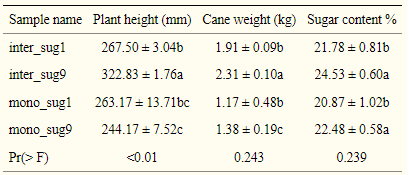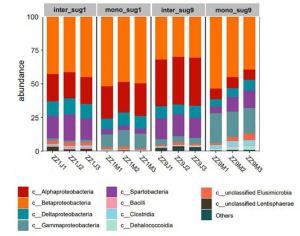A group from College of Agronomy, Guangxi University, Nanning, China, etc. has reported effects of intercropping on plant growth promotion and rhizobacteria comparing with monoculture.
https://www.ncbi.nlm.nih.gov/pmc/articles/PMC8515045/
Two new sugarcane cultivars, ZZ1 and ZZ9, and a local soybean cultivar, GUIZAO2, were used for this experiments. Two intercropping patterns of sugarcanes and soybean (ZZ1J and ZZ9J) were compared with each monoculture (ZZ1M and ZZ9M).
As a result, it was found that the promoting effect of ZZ9–soybean intercropping was more significant than that of intercropping with ZZ1 as shown below.

And, it was also found that the relative abundance of Alphaproteobacteria in ZZ9–soybean intercropping (ZZ9J) was higher than that of ZZ1 intercropping mode (ZZ1J) as shown below. As a note, alphaproteobacteria includes a large number of symbiotic nitrogen-fixing bacteria in soil.

It is quite reasonable to consider that the change observed here would be closely related to the production of crop root exudates, which act as signals mediating root–microbial interactions.
